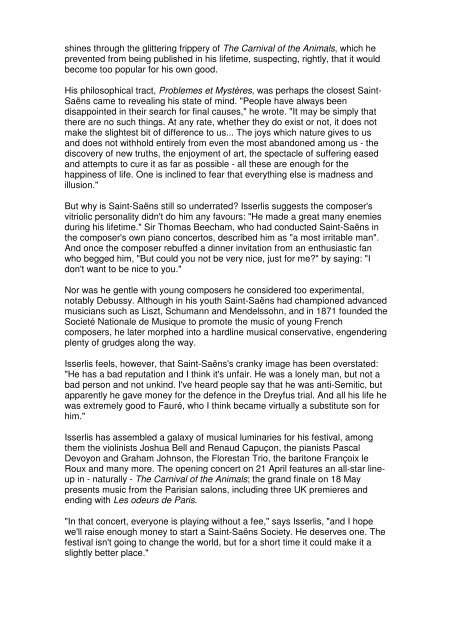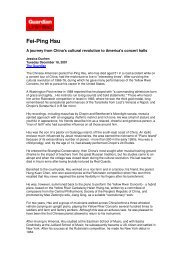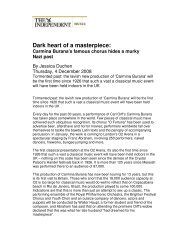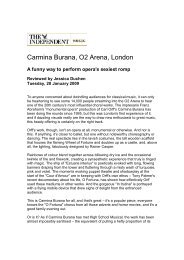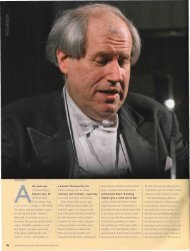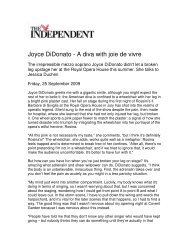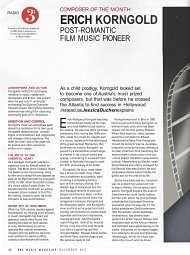The composer who disappeared (twice) - Jessica Duchen
The composer who disappeared (twice) - Jessica Duchen
The composer who disappeared (twice) - Jessica Duchen
You also want an ePaper? Increase the reach of your titles
YUMPU automatically turns print PDFs into web optimized ePapers that Google loves.
shines through the glittering frippery of <strong>The</strong> Carnival of the Animals, which he<br />
prevented from being published in his lifetime, suspecting, rightly, that it would<br />
become too popular for his own good.<br />
His philosophical tract, Problemes et Mystères, was perhaps the closest Saint-<br />
Saëns came to revealing his state of mind. "People have always been<br />
disappointed in their search for final causes," he wrote. "It may be simply that<br />
there are no such things. At any rate, whether they do exist or not, it does not<br />
make the slightest bit of difference to us... <strong>The</strong> joys which nature gives to us<br />
and does not withhold entirely from even the most abandoned among us - the<br />
discovery of new truths, the enjoyment of art, the spectacle of suffering eased<br />
and attempts to cure it as far as possible - all these are enough for the<br />
happiness of life. One is inclined to fear that everything else is madness and<br />
illusion."<br />
But why is Saint-Saëns still so underrated? Isserlis suggests the <strong>composer</strong>'s<br />
vitriolic personality didn't do him any favours: "He made a great many enemies<br />
during his lifetime." Sir Thomas Beecham, <strong>who</strong> had conducted Saint-Saëns in<br />
the <strong>composer</strong>'s own piano concertos, described him as "a most irritable man".<br />
And once the <strong>composer</strong> rebuffed a dinner invitation from an enthusiastic fan<br />
<strong>who</strong> begged him, "But could you not be very nice, just for me?" by saying: "I<br />
don't want to be nice to you."<br />
Nor was he gentle with young <strong>composer</strong>s he considered too experimental,<br />
notably Debussy. Although in his youth Saint-Saëns had championed advanced<br />
musicians such as Liszt, Schumann and Mendelssohn, and in 1871 founded the<br />
Societé Nationale de Musique to promote the music of young French<br />
<strong>composer</strong>s, he later morphed into a hardline musical conservative, engendering<br />
plenty of grudges along the way.<br />
Isserlis feels, however, that Saint-Saëns's cranky image has been overstated:<br />
"He has a bad reputation and I think it's unfair. He was a lonely man, but not a<br />
bad person and not unkind. I've heard people say that he was anti-Semitic, but<br />
apparently he gave money for the defence in the Dreyfus trial. And all his life he<br />
was extremely good to Fauré, <strong>who</strong> I think became virtually a substitute son for<br />
him."<br />
Isserlis has assembled a galaxy of musical luminaries for his festival, among<br />
them the violinists Joshua Bell and Renaud Capuçon, the pianists Pascal<br />
Devoyon and Graham Johnson, the Florestan Trio, the baritone Françoix le<br />
Roux and many more. <strong>The</strong> opening concert on 21 April features an all-star lineup<br />
in - naturally - <strong>The</strong> Carnival of the Animals; the grand finale on 18 May<br />
presents music from the Parisian salons, including three UK premieres and<br />
ending with Les odeurs de Paris.<br />
"In that concert, everyone is playing without a fee," says Isserlis, "and I hope<br />
we'll raise enough money to start a Saint-Saëns Society. He deserves one. <strong>The</strong><br />
festival isn't going to change the world, but for a short time it could make it a<br />
slightly better place."


